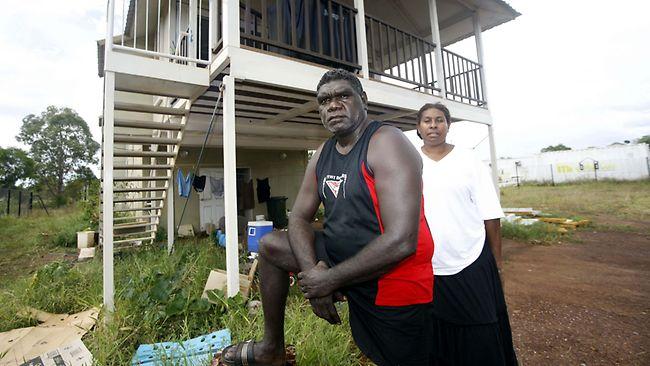Serious delays stymie remote housing scheme
EXCESSIVE bureaucracy, disputes and problems with leasing arrangements have thrown the remote Aboriginal home ownership scheme into chaos.

EXCESSIVE bureaucracy, disputes and problems with leasing arrangements have thrown the remote Aboriginal home ownership scheme into chaos.
As the Home Ownership on Indigenous Land scheme stalls nationwide, The Weekend Australian can reveal that on the Tiwi Islands - the first remote community in Australia to sign a township lease - serious dysfunction has marred the scheme's rollout.
A handful of indigenous people have experienced extreme delay in the completion of their kit homes, which could have been erected in days. Two homes are still unfinished up to two years after their contracts were signed.
A bitter financial dispute between two builders has contributed to the serious delays in construction of new homes at the Tiwi Islands township of Nguiu, triggering complaints from indigenous people that they wish they had never signed up for mortgages.
Federal government subsidiary Indigenous Business Australia has been slow in releasing funds to allow building work, and statutory delays in the release of sub-leases by the Northern Territory and federal governments have deepened the bureaucratic mess.
The IBA - which acts as financier for indigenous clients - has been accused by one construction industry figure of acting as "gatekeeper and social worker" and stymying efforts to create private economies on Aboriginal land.
The IBA is providing finance to 15 indigenous families at the Tiwi Islands under the HOIL scheme, which provides low-interest loans to eligible Aboriginal people with minimal deposits required.
But as the scheme began to falter earlier this year on the Tiwi Islands, and leasing negotiations in other remote communities failed to progress, the federal government quietly diverted more than $50 million from the remote housing program to cater for an exploding demand among urban-based indigenous people to buy their own homes.
While Nguiu has been promoted by the IBA as a stand-out success story in indigenous home ownership, the early rollout of the HOIL scheme was beset by difficulty.
Aboriginal couple Nazareth Alfred and Greg Orsto say they are disgusted with the way the IBA has managed the home ownership scheme. Yet two years ago, when the couple were living in a tent owing to a lack of housing on the island, home ownership seemed an ideal solution.
The couple, who have a combined income of $140,000, have bought a $341,000 two-storey home through the HOIL scheme. They pay about $500 a week in repayments and interest payments, which are pegged to their income and below market rate.
But the couple now say they wish they had never signed up to buy a home under the HOIL. More than two years after building began, they are still cooking on a gas burner and still have no power connected to their home.
Despite this, the couple have been paying mortgage and interest payments since June.
"The whole idea of having a home ownership scheme was to better our lives," Ms Alfred says. "But it's just made it worse.
"I could have easily bought a house in Melbourne and been in my house by now, instead of having this headache."
The director of a company that constructed the home for Ms Alfred and Mr Orsto, Shaun Mowbray, has accused the IBA of contributing to serious delays experienced by his clients by refusing to release funds and unreasonably interfering in the construction process.
"The IBA have acted like gatekeepers," Mr Mowbray says. "They have been slow on payments and unresponsive to complaints. They are certainly not helping the privatisation and the simplification of building Aboriginal housing."
Mr Mowbray says there is only about $1000 of "tidy-up" work still to be done on Ms Alfred and Mr Orsto's home, and he is working to connect their power despite the fact that it is not his responsibility.
"I've done everything to try and make it right for them," Mr Mowbray says. "We've provided about $50,000 worth of free inclusions by way of a gratuity or apology for the delays caused in the contract, despite the fact many of them were not of our doing."
Mr Mowbray says he has provided excellent value for money for indigenous clients on the Tiwi Islands, and two out of four of his clients are very happy with their homes.
While the IBA says it is unable to comment on the individual experiences of clients, it has raised issues with construction quality control in remote communities. It says it was unable to resolve any issues between Ms Alfred and Mr Orsto and their builder because the IBA was not a party to the construction contract.
Delays in construction on the Tiwi Islands were also complicated by an acrimonious business dispute between Mr Mowbray and another construction industry figure, Matthew Hornibrook, the director of a company in which former prime minister Bob Hawke held shares.
Fox Hornibrook held the original contract to build the first house of the Tiwi Islands, but the contract was terminated early in the construction process. Mr Hawke's spokeswoman said the former prime minister "had not worked with the company for some time".
The IBA rejected accusations that it had mismanaged the HOIL scheme on the Tiwi Islands and said most of its clients had had positive experiences.
"It is unfortunate that problems have arisen for some customers during the early rollout of the HOIL program in Nguiu," a spokesman said.
A spokeswoman for Indigenous Affairs Minister Jenny Macklin said the government was committed to land tenure reform, and would make funds available to HOIL customers if demand for that program accelerated.



